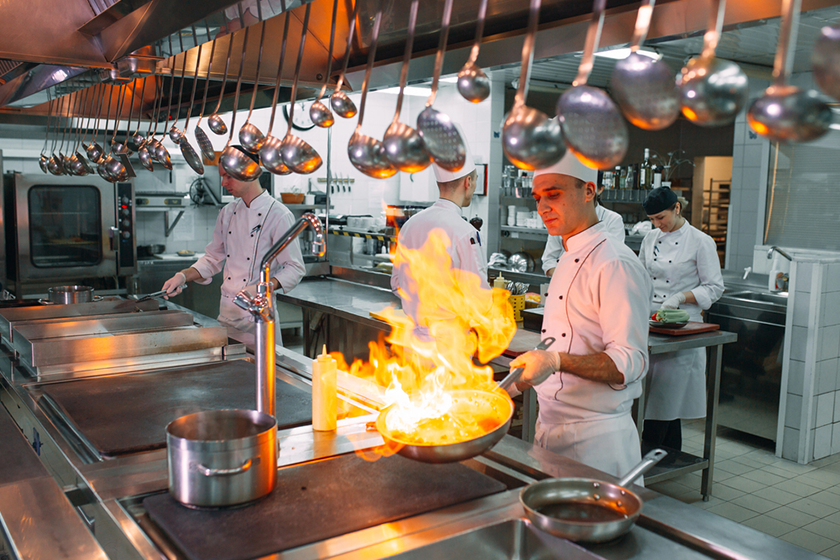What Is UL 300 And Why Does It Matter For Restaurant Safety?

UL 300 stands as a cornerstone for fire protection. Established by Underwriters Laboratories in 1994, this fire safety standard was developed in response to evolving fire hazards in commercial kitchens.
The introduction of UL 300 marked a significant shift in how fire suppression systems are designed and implemented, reflecting the changing dynamics of cooking methods and equipment.
But what exactly is UL 300, and why is it crucial for the safety of your restaurant?
The Historical Context of UL 300
To fully appreciate the importance of UL 300, it’s essential to understand its historical context. Before the mid-1990s, most commercial kitchens relied heavily on animal fats, like lard, for frying and other high-temperature cooking processes. These fats were relatively easy to extinguish using the dry chemical fire suppression systems that were standard at the time.
However, as the restaurant industry began to prioritize healthier cooking methods, a shift towards using vegetable oils became prevalent. These oils, used in approximately 70-75% of cooking today, have a higher ignition temperature and present a more challenging fire hazard.
Traditional dry chemical systems were no longer adequate, as they struggled to extinguish fires fueled by these modern oils fully. The result was a growing need for a new fire suppression standard—leading to the creation of UL 300.
The Core Components of UL 300
UL 300 revolutionized fire safety in commercial kitchens by introducing wet chemical fire suppression systems requirements. These systems are designed to address the unique challenges posed by modern cooking oils and equipment, ensuring that fires are not only extinguished but also prevented from reigniting. The main features of UL 300-compliant systems include:
- Wet Chemical Agents: Unlike older systems, UL 300 mandates the use of wet chemical agents that are specifically formulated to suppress the flammable vapors produced by burning vegetable oils. These agents create a blanket over the fire, smothering it and cooling the heat source to prevent re-ignition.
- Comprehensive System Design: A UL 300-compliant system must include a variety of components such as manual pull stations, automatic fire detection systems, and automatic fuel shut-offs for both gas and electric appliances. Additionally, nozzles must be strategically positioned in the hood, duct, and over each grease-generating cooking appliance to ensure comprehensive coverage.
- Rigorous Maintenance Protocols: To maintain UL 300 compliance, the fire suppression system must undergo regular maintenance. This includes semi-annual servicing by a licensed professional, as well as frequent cleaning of hoods, ducts, and baffle filters to remove grease buildup that could fuel a fire.
Why UL 300 Matters for Restaurant Safety
The significance of UL 300 extends far beyond mere compliance with regulations. Implementing a UL 300-compliant fire suppression system is a proactive measure that protects your restaurant, employees, and customers. Here’s why UL 300 is indispensable for restaurant safety:
- Enhanced Fire Safety with Modern Cooking Hazards
As restaurants continue to embrace healthier cooking methods and advanced kitchen technology, the potential for severe kitchen fires increases. UL 300-compliant systems are specifically designed to address these modern hazards, providing a level of fire protection that older systems simply cannot match.
By utilizing wet chemical agents, these systems not only extinguish flames but also cool the source of the fire, significantly reducing the risk of re-ignition—a common issue with non-compliant systems.
- Legal and Insurance Compliance
In addition to the obvious safety benefits, UL 300 compliance is often a legal requirement. Many states have adopted fire codes such as NFPA 17A and NFPA 96, which mandate that commercial kitchen fire suppression systems meet UL 300 standards.
Failure to comply with these regulations can result in hefty fines and legal repercussions. Moreover, most insurance companies require UL 300 compliance as a prerequisite for coverage. Without it, you may find yourself without financial protection in a fire-related incident.
- Protection of Life and Property
The primary goal of UL 300 is to safeguard lives and property. A UL 300-compliant system can mean the difference between a minor incident and a catastrophic fire threatening your employees, customers, and business.
By investing in a system that meets UL 300 standards, you are taking a critical step towards ensuring the safety of everyone in your restaurant. Non-compliance exposes your business to potential liability and puts lives at risk.
Implementing UL 300 Systems: What You Need to Know
For restaurant owners, installing a UL 300-compliant fire suppression system is not just a regulatory obligation—it’s a vital component of your overall emergency management and services strategy. The process of becoming UL 300 compliant involves several key steps:
- Assessment
The first step in implementing a UL 300 system is to assess your current fire suppression setup and cooking equipment. This assessment should be conducted by a qualified fire protection professional who can identify any gaps in your existing system and recommend necessary upgrades.
- Installation
Once the assessment is complete, the next step is to work with a licensed fire protection company to design and install a UL 300-compliant system tailored to your kitchen’s needs. This process includes ensuring that all components, such as nozzles and fire detection systems, are properly positioned and functioning.
- Regular Maintenance
UL 300 compliance is not a one-time achievement; it requires ongoing maintenance to remain effective. Establishing a routine maintenance schedule with a licensed service provider is essential to ensure your system continues operating at peak performance. This includes regular inspections, cleaning, and servicing of all components.
Why Choose Us for Your UL 300 Compliance Needs
At Fire Safety Alarms, we understand the critical importance of UL 300 compliance for your restaurant’s safety. Our team of experienced professionals is dedicated to providing top-notch fire alarm services and systems tailored to meet the unique needs of commercial kitchens.
We take pride in our comprehensive service offerings, from the initial assessment and installation to ongoing maintenance and emergency management and services. When you partner with us, you’re not just meeting regulatory requirements—you’re investing in the safety of your employees, customers, and business.
With over four decades of experience in the fire protection industry, we are uniquely positioned to help you achieve and maintain UL 300 compliance, ensuring that your restaurant is fully equipped to handle any fire-related emergency.
